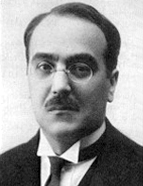

Fidelino de Sousa Figueiredo, the son of army officer José de Sousa Figueiredo and Rosa Augusta Coelho da Fonseca (de Figueiredo), undertook his secondary education (1899-1906) at the former Liceu Central de Lisboa, and then entered the Curso Superior de Letras (1906-1910) where he completed his Historical Geography course with the submission of his thesis entitled Educação da Abstracção [Education of Abstraction]. In 1910, he was hired as a History and Philosophy teacher at the Liceu da Lapa. On February 9, 1911, he married Dulce Elisa Lobo da Costa (Figueiredo). That same year, he was appointed permanent teacher at the Liceu de Faro.
Along with Cristovão Aires, David Lopes and José Leite de Vasconcelos, he created the Sociedade Nacional de História [National History Society] between April and May 1911, later renamed the Sociedade Portuguesa de Estudos Históricos [Portuguese Society of Historical Studies](SPHE). By bringing together various prominent personalities from different political backgrounds on the Portuguese cultural scene, both within the scope of the Society itself and in the Revista de História, Fidelino gained visibility in the field of Portuguese historiography.
In 1913 he was transferred to the João de Deus and Gil Vicente Liceus in Lisbon. He worked for the Ministry of Public Instruction on several occasions: drafting a history syllabus for secondary education (1914), in line with the SPEH's aims of renewing national historical studies; Chief of Staff to the Minister of Public Instruction during the Sidonist period (1917-18), and extraordinary examiner at the Escolas Normais Superiores of the Universities of Lisbon and Coimbra. (1926-27).
In recognition of his intellectual work in History, Literature and Literary Criticism, he was elected a corresponding member of the Lisbon Academy of Sciences in 1915. In 1917, he ran as candidate for the Lisbon City Council on the Unionist Party ticket and began his active political life. In 1918, he was appointed Director of the National Library, the most important position of this period, resuming this post in 1927, during the military dictatorship.
Most of his intense political activity was seen during Sidónio's "New Republic", of which he was a staunch supporter, having been elected assemblyman for Silves (Jul. 1918-Fev. 1919).
